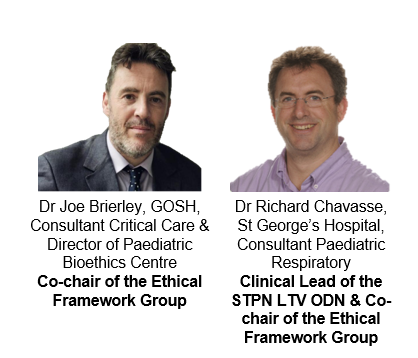Each year, an increased number of children are initiated on Long Term Ventilation. It has become clear that a standardised, network approach to initiation is required – one that takes in to account the ethical approaches to ongoing treatment. Pressures on paediatric services around high-profile, appropriateness-to-treat cases reinforce this need.
The pan-London Ethical Framework Group is a multi-disciplinary and multi-agency group that aims to develop an ethical framework for LTV initiation that occurs in a multi-disciplinary team approach with all stakeholders engaged, and in a child and family-centred manner.
The framework will be used by the full MDT LTV team, which includes Respiratory Consultants and Nurses, Physiotherapy, PICU and NICU teams, Community nursing and Physiotherapy teams, Psychologists, Speech and language Therapists, Dietitians, Social Services, Palliative Care teams, Commissioners, Local ethics teams, Parents, careers and families.

The objective of the pack is to:
Currently, education and training that is delivered to parents, carers and healthcare staff varies across the region, with little quality assurance to the standard and content of the education / training being delivered and on-going competence review processes.
STPN has focused on a streamlined approach to education, training and competency for parents / carers of children requiring NIV / LTV / Tracheostomy care.
The second element to this project is to standardise the current education training and competency offering for staff in DGHs where children are often cared for when they become acutely unwell and cannot stay at home.
The project has involved specialists and key stakeholders from across the network including Respiratory and LTV CNSs.
Discharge is often a complex time for both hospitals and children and young people and their families and across the STPN each centre and team has their own approach to this. This results in variation in clinician involvement, documentation completed and wider engagement of the MDT around the child. This variation often impacts both patient flow and the experience of care for children and their families.
STPN have therefore been developing an exemplar discharge reference guide. The aim is to streamline and encourage a consistent approach to discharge, and enhance the patient and family experience of the journey from hospital to home. The pack includes a Guide to the 10 Principles of Discharge Guide and various tools to support implementation such as Discharge planning meeting templates, Discharge checklists, Home assessment templates and a Patient passport which includes regional respiratory action plans and a hospital admission protocol.
The objective of the pack is to:
Increase the consistency, safety and child and family-centred discharge pathway from hospital to home for children with complex needs.
Benefits: